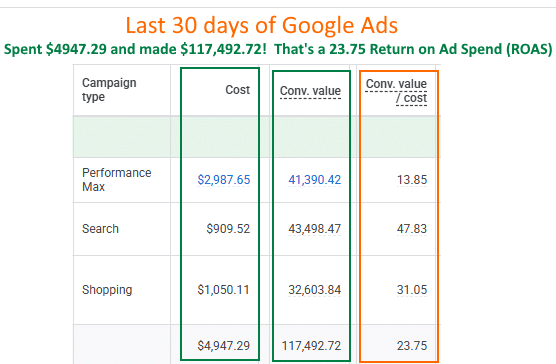EDITOR’S NOTE: Social media is pretty under the radar as far as keyword research goes, but it’s a great way to find keywords that will not only rank on Google, but that your audience will love too. Social media gathers information such as what we like, the places we go, and what type of content we typically like to digest. So how can you use social media to gather inspiration for content, target ads, or to improve your SEO. Keep up on trends by viewing trending categories on platforms like Youtube and Twitter. Search hashtags on Instagram. Check autocomplete suggestions on Youtube and Pinterest. Use Facbook’s ad targeting options to get a glimpse into your audience’s behavior. All of these help you find trending topics that your audience will love that you may not find via a keyword research tool.
Social media offers a wealth of data for SEO pros to tap into. Here are some ways to use social media for keyword research.
Need some new, hot, steaming keywords to target?
Yeah, me too.
If you’re like me and are tired of using the same keywords as everyone else, it’s time to dig into social media.
I know social might not be the first thing that comes to mind when you think about keyword research – but it can be an awesome source for long-tail and high-traffic keywords.
Here’s why:
The average person spends nearly three hours of their day on social media, and social platforms are steadily gathering information about what we do, who we like, where we go, and what type of content makes us click.
Which makes it like walking into a room of puppies for keyword research.
Let’s look at eight ways you can leverage social media to uncover keywords to inspire content, target PPC ads, or for SEO.
1. Use Facebook Ad Targeting Options for a Peek into Audience Behavior
Even if you know who your target audience is, there’s a good chance you don’t know everything about them.
But Facebook does.
The social platform is where most of us share details about our lives, our jobs, what shows we like, what topics we are interested in, and what products we buy.
Facebook gathers all that data for ad targeting. However, it can also be used for keyword research and finding related topics.
Using Facebook targeting options, you can learn about your audience’s:
- Location.
- Age.
- Gender.
- Interests.
- Relationship status.
- Languages.
- Education level.
- Where they work.
Tip: Facebook groups are another great source for key terms. Look for “popular topics” in industry groups for keyword ideas:
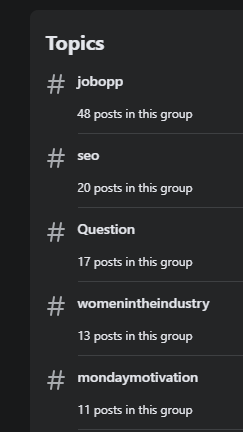
Photo: Search Engine Journal
2. Dive Into Twitter’s Search Functionality
Ah, Twitter.
Home of bite-sized content, breaking news, and some weirdness, too.
Unlike other platforms, where content might stay fresh for several hours (or even several days), Twitter trends move in almost real-time.
It makes Twitter ideal for finding timely key terms.
To find interesting topics, head to the “explore” section.
You’ll see several options – pay special attention to the topics under “for you” and “trending.” These are topics that people in your area and industry are talking about.
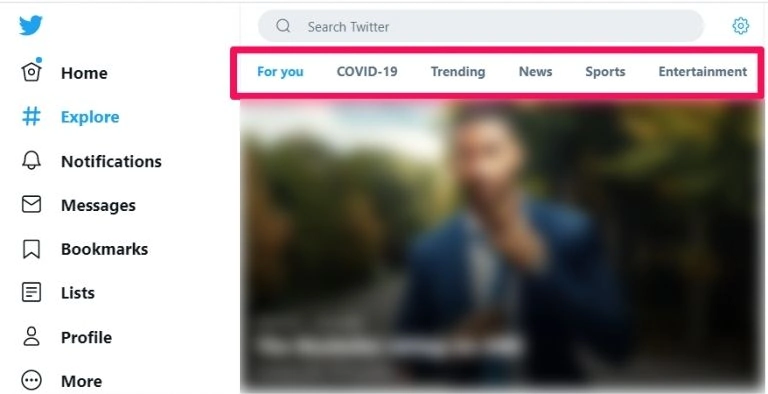
Photo: Search Engine Journal
The one drawback to this strategy is it isn’t as useful if you aren’t already active on Twitter.
Move your business forward with content marketing
Enhance your online visibility, reach new customers, and drive sales with this all-in-one content marketing toolkit.
If you are, however, Twitter is a treasure trove for topic ideas and long-tail keywords you can use in SEO.
3. Search Instagram Hashtags to Discover Relevant Content
What started as a way to share photos of dogs and avocado toast is now a bonafide search engine thanks, in part, to hashtags.
Head to Instagram and search for key terms you want to target, then take a look at the other hashtags users add to posts.
Let’s say you want to post about SEO content. Search for #SEO, then look at hashtags recent posts are using.
The first few posts were spammy, so I skipped those. A few posts in, I found one using these hashtags:
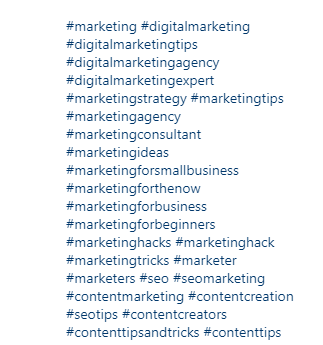
Photo: Search Engine Journal
Jackpot! It’s raining tacos and burritos!
Tons of long-tail and related key terms I can use for content creation, SEO targeting, even paid ads. Searching each of those hashtags will provide me with even more keywords.
You can also use the autocomplete feature for keyword research.
Let’s say I want to find content related to B2B marketing.
Instagram kindly shows me other topics users are interested in. I can use those hashtags in my Insta content to increase my reach – or add them to my long-tail key term list.
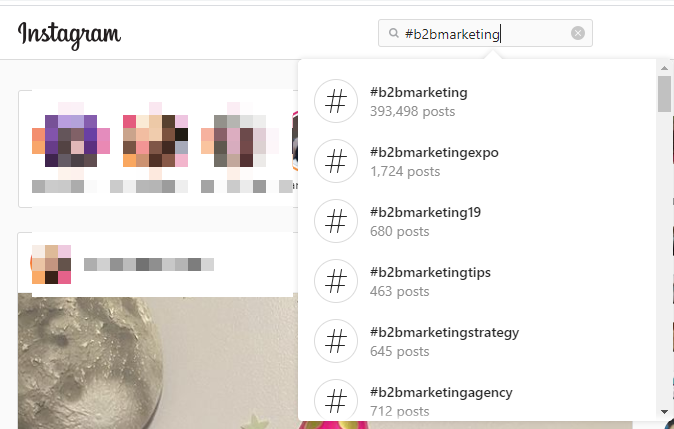
Photo: Search Engine Journal
4. Use YouTube’s Autocomplete Search Functionality
YouTube isn’t just for finding funny cat videos – it’s actually the second most popular search engine (coming in #2 behind Google.)
To find related key terms, type in the main term and see what YouTube delivers:
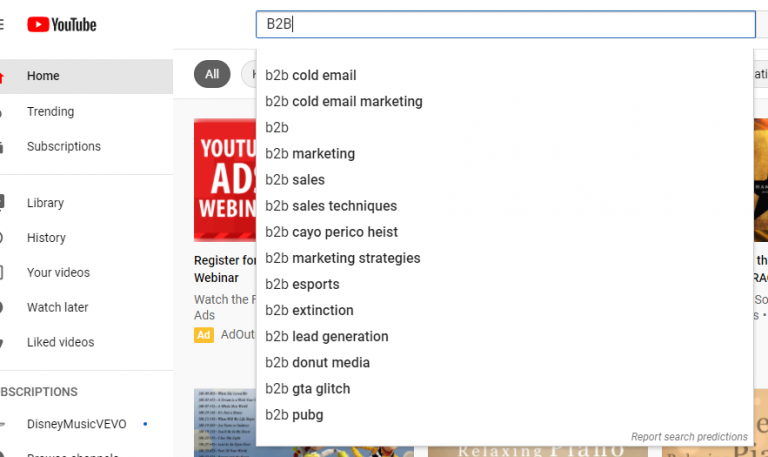
Photo: Search Engine Journal
Granted, not all terms are useful – for example, [B2B gta glitch] is probably not what you’re looking for if you search B2B – but it’s still a great source for topic ideas and SEO keywords.
5. Dig Into Search Trends on Pinterest
Pinterest is home to more than burrito recipes and travel bucket lists – it can also be helpful for digging up long-tail keywords you might not have thought of on your own.
Like other search engines, Pinterest returns results based on what content it thinks users are most likely to interact with.
For example, searching [keyword research] returns a ton of content about how to analyze keywords, use free tools, and research specifically for organic traffic.
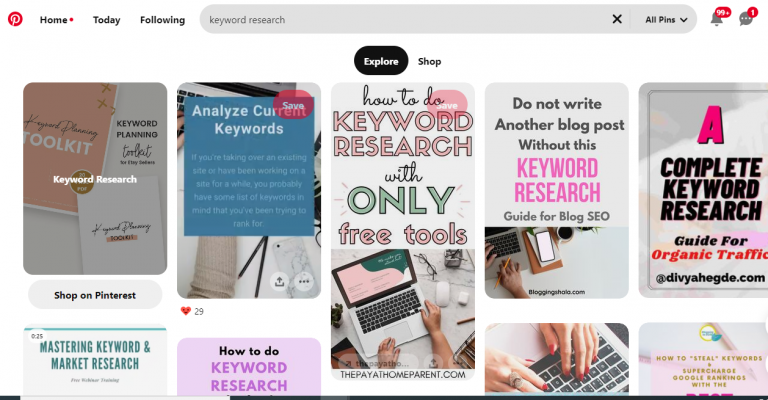
Photo: Search Engine Journal
These are all long-tail keywords I can target use for SEO or content creation.
Pinterest autocomplete provides even more ideas by suggesting search additions to a core keyword:
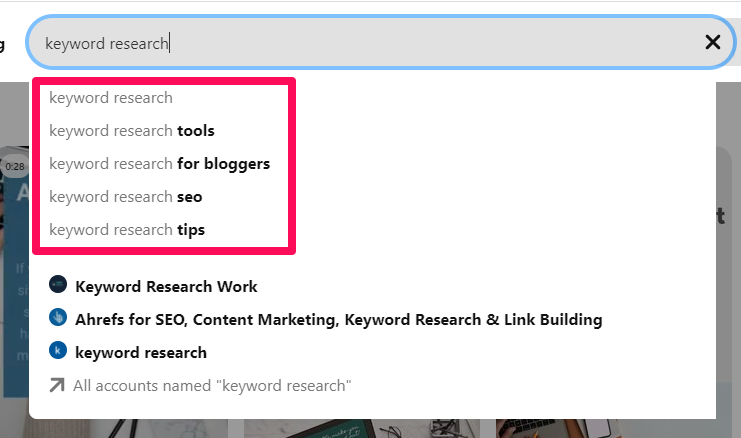
Photo: Search Engine Journal
6. Listen to What Influencers Are Saying on Linkedin
Linkedin is home to more than 722 million users and is seeing record levels of engagement.
If you are in B2B, sales, marketing, or target high-level decision-makers, Linkedin should become your new home.
There are a few ways to use Linkedin for keyword research, including following what influencers are talking about.
Search for a keyword, then select people to find influencers, then click See all activity on their profile. This will show you any posts they’ve shared in the last 90 days.

Photo: Search Engine Journal
Look for hashtags, content ideas, and groups they interact with.
Like YouTube and Instagram, you can also use Linkedin’s autocomplete feature to find related terms:
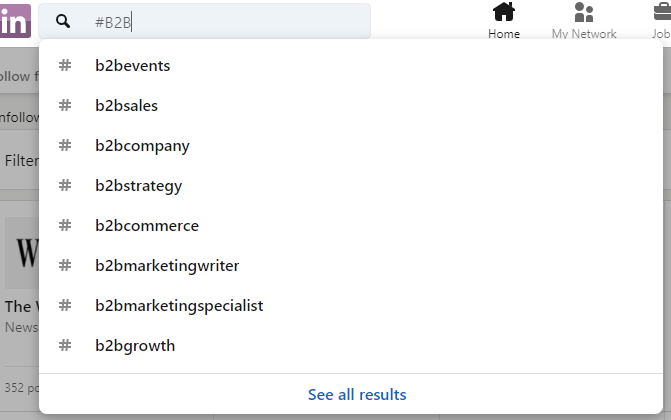
7. Use BuzzSumo
BuzzSumo is a social media tool designed to help you find the most engaging topics, connect with influencers, and monitor popular topics.
That might now sound like the best place for keyword research, but it is.
Here’s why – Buzzsumo looks at the most engaging content across multiple social platforms, which means it’s listening just about everywhere.
Here are the results for “b2b sales”:
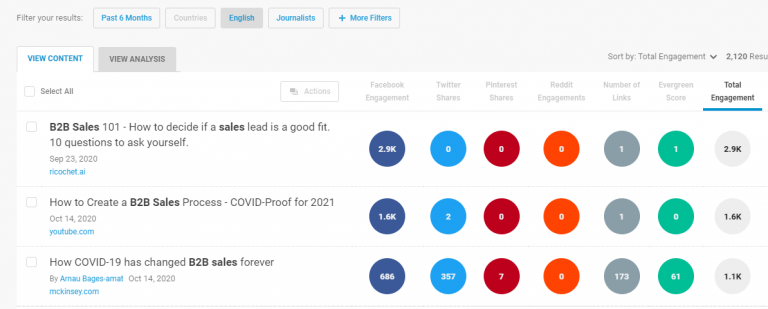
Photo: Search Engine Journal
Notice it shows the most engaging content on Facebook, Twitter, Pinterest, and Reddit.
Plus, you can use the filters to sort by location, content type, word count, and dominate reaction.
I also like the “influencers” search tool, which lets you search for the topics the most influential people in the industry are talking about.
8. Explore Your Social Listening Tool
If you already use a social listening tool, like Awario and Mention, they are another solid source for keywords.
These tools do the legwork for you by gathering all the major topics people are talking about in one place. This will save you time, as you won’t have to dig into several tools.
You can also filter out the noise so you can focus on keywords that matter for your brand and industry.
Use it to track your brand name, follow industry trends, and find influencers.
Social & Search Go Together Like Milk and Cookies
Social and search aren’t as separate as you might think. Sure, social media isn’t a direct ranking factor, but they are complementary.
Social can help you better understand what topics your audience is interested in, what they post, and where they are most active.
Like milk and cookies, social and SEO are better together!
Originally posted on Search Engine Journal.


